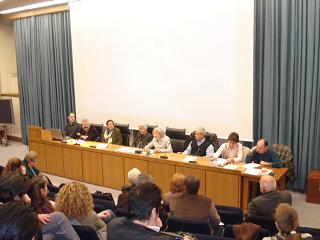by Artemisia Pappas,
Argyri Panezi
& Sophia Panagiotopoulou
Athens Law School students
The Greek Society of Criminology and the Center for Penal and Criminological Research conducted an event-discussion entitled: "A Code of Ethics for Criminologists – a moral project for the 21st century?" on Tuesday, March 18, 2008.
The event was opened by Aliki Marangopoulos, President of the Greek Society of Criminology, who described her support for the creation of codes of conduct for Criminological researchers and professionals.

The panel moderator, Emeritus Professor of Criminology
Calliope Spinellis, argued that a Code of Ethics comprises a set of rules governing the conduct of, and methods employed in, research or professional duties. The Professor highlighted the importance and effectiveness of such a statute, and also the problem of compiling the actual content of the code for the task at hand.
Mr.
T. Papadakis, President of the Association of Greek Psychologists referred to their respective code of ethics, which was established in 1978. He explained that the Psychologists Code of Ethics was greatly influenced from abroad, especially America, where the profession was much more developed. Their Code of Ethics addresses both practicing, researchers and academic psychologists, and binds them to a set of moral principles similar to those of journalism. An important condition is the ability to file complaints against a psychologist, which are judged by the governing authority for departure from the basic principles of the Association. Worthy of note is the

psychologist’s obligation of confidentiality to their client. The only exception is when there is a material danger to the client or third party, in which case information may be shared with authorities and agencies. Reference was also made to the subsequent EFPA (European Federation of Psychologists΄ Association) Ethics Conduct, adopted in 1995, and the Charter of Professional Ethics for psychologists, which sets out the fundamental rights of respect, responsibility, competence and integrity.
Ms. Martikian-Gazerian, Professor of Social Work and member of the Association of Social Workers, referred to the existing codes of conduct in her profession, stating that the introduction of such a code requires preparation from its practitioners, because it will restrict our job, even if it leads to improvements in research and practice. In any case, the degree to which a Code of Ethics may impose its control over the profession should be carefully considered. The speaker then went on to describe the relevant authorities, recommendations and requirements imposed by the Code of Ethics for social workers in accordance with the relevant law of 1992. In closing, the speaker emphasized the debate around whether the code is binding only to members of the Association or anyone engaged in the profession.
N. Fakiolas, doctor of Sociology, Vice President of the Hellenic Institute of Sociology, Director of Research at the E.K.K.E., referred to the respective Code for Sociologists. A characteristic of this Code is that it provides best practice guidelines without penalties, since disciplinary activities are already administered by existing associations and special laws.
Ms.Effie Lampropoulos, Professor of Criminology at the Panteion University, began by outlining the three axes of research ethics, scientific ethics and moral responsibility. She acknowledged that professionals need to abide by all three in the exercise of their duties, but did not find it necessary to create a specific Code of Conduct to ensure compliance. Whilst acknowledging the usefulness of such codes, she objected to voluntary participation and compliance depending membership of the respective association. She also wondered if standards apply to Greek researchers working abroad. In conclusion, the Professor felt that a Code of Conduct is not strictly necessary, suggesting instead the formation of an appropriate advisory committee.
 Nikolaos Koulouris
Nikolaos Koulouris, Criminologist at the Judicial Prison of Korydallos, noted the particular set of conditions encountered in prisons. He cited the problems faced by the profession and raised an important question "How should a Criminologist operate in order to convey the inmates’ problems and find ways to help solve them?" The difficulty lies in the fact that the Criminologist is most often forced to act as an administrative instrument and is faced with conflicting interests. He pondered therefore whether the codification of professional principles would free him from the “law of the strong ..." and allow him a more independent role.
The last speaker was Maria Kranidiotis, Assistant Professor of Criminology at the Kapodistrian University of Athens. She addressed the content of such a code for Criminology; in particular impartiality, confidentiality, avoiding damaging the mental health of research subjects, etc. It should include obligations for both practitioners and researcher. However, she suggested that such rules should not be mandatory, but advisory, as a complement to prevailing Greek law. Finally, she referred specifically to professional secrets under Article 212 of the Criminal Code, proposing the addition of new professions such as social sciences, humanities professions, occupations and social assistance.
At the end of the event, Nestor Courakis, Professor at the Kapodistrian University of Athens (Law School) expressed the necessity for a code of conduct for criminologists to be drawn up, noting however the difficult and marginal issues that must be answered in advance in order to achieve maximum effectiveness of effort.





